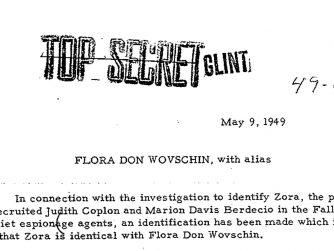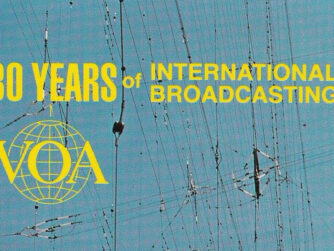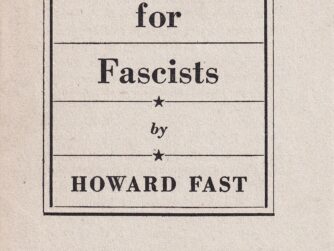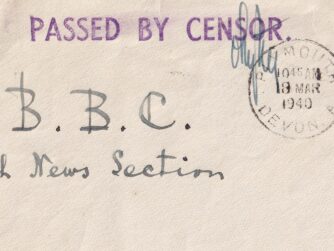Hampered by the State Department on Stalin’s Death
On March 5, 1953, in answering questions from Roy Cohn, the chief counsel for the subcommittee, and from the subcommittee’s chairman, Senator McCarthy, Barmine described how State Department’s policy experts overseeing Voice of America programs prevented him and the VOA Russian Branch from analyzing possible consequences of Stalin’s death, which occurred only a few hours after his testimony ended in Washington.

Mr. COHN. [Roy Cohn, Chief Counsel for the Subcommittee]. Mr. Barmine, you have told us about these policy decisions from Washington that played down this purge issue [anti-Semitic purges in the U.S.S.R. and Soviet Bloc countries]. Now, are there any other specific examples you know of in Washington, where instructions were issued which you regarded as unsound, particularly dealing with important issues having to do with your service, which interfered with an effective anti-Communist program?
Mr. BARMINE. Yes, there were.
Mr. COHN. Can you tell us about any specific examples?
Mr. BARMINE. Well, one of the cases that I consider pretty important was a case of the treatment of possible death or illness of Premier Stalin.
Mr. COHN. When did this issue arise? Just within the last day or so?
Mr. BARMINE. No, this issue arose during the party congress last year.
Mr. COHN. That was last October?
Mr. BARMINE. Yes. Our job, and particularly my duty, is to look for the vulnerable spots, attacking those spots, we could make our propaganda the most effective.
Now, in studying the stenographic report of the congress of the party, I noticed an extremely curious thing. Practically every speech by a Russian leader or by every foreign Communist Party leader was ending with phrases like “Long live Stalin,” “Stalin must live for ever,” and so on. If it would be only once or twice, it would be not significant. But practically every speech ended this way.
The secretary of the Greek Communist Party, for instance, finished his speech by saying, "Every woman of Greece is ready to give 1 year of her life for 1 minute of Stalin’s life, for prolongation of Stalin's life. Because there are millions of them, Stalin will live forever." The Albanian delegate said, "Let Stalin live as long as the Albanian mountains.”
There was a certain pattern there, and after analyzing it, I came to the conclusion that this is a rather pathological fear of mentioning the possibility of Stalin's death. Why? For a very simple reason.
Communist propaganda for almost 30 years has ascribed every success in the Soviet Union personally to Stalin. Anything that goes well—it is because of the personal participation of Stalin. So they put themselves in their own trap. When everything depends on Stalin, that means if Stalin might get sick, or die, everything can go to pieces. They were pathologically afraid to mention the possibility of Stalin’s death or illness.
So we decided this was a vulnerable spot and we should hit this spot.
I wrote a memorandum on this subject. I can’t quote it, because this memorandum is confidential. I wrote a memorandum to my superiors in the Voice, giving those quotations and offering the possibility of treatment, that we should pound on the question of the possible death of Stalin, and dissension and troubles in case of succession.
My superior in the Voice of America, Mr. Kretzmann, supported my memorandum and addressed his own, with my suggestions, to Washington.
Now, we also offered a script, which was called Stalin’s Testament. We had the idea of Stalin dying—these scripts were pre- pared in October and November—of Stalin dying, writing a testament like Lenin did, and what happened after this testament is read by his successor, with the fight going on.
Those things were presented to the International Information Administration, to Mr. Bradley Connors.
Mr. COHN. Mr. Connors is the top policy adviser, who was under Dr. Compton and Mr. Harris in the International Information Administration. Is that right?
Mr. BARMINE. That is right.
Mr. COHN. By the way, are you familiar with Mr. Connors’ testimony before this committee?
Mr. BARMINE. I watched it on television, sir.
Mr. COHN. You heard him say that he had never read any book by Marx, Lenin, Engels, or Stalin, and knew nothing about Communist propaganda or tactics?
Mr. BARMINE. I did.
Mr. COHN. And you say that this was presented to Mr. Connors?
Mr. BARMINE. That is right.
Mr. COHN. Your plan concerning taking advantage of this obvious weakness as demonstrated by the party congress?
Mr. BARMINE. Yes. The Voice officials in New York supported this and tried to put it through the International Information Administration through Mr. Connors’ office.
Mr. COHN. We want to make this clear. Because Mr. Connors has no connection with the Voice of America, as such.
Mr. BARMINE. No; he is not a member of the Voice of America. He is a superior policy officer who gives us guidance or decides on these kinds of issues, such as the question of: Should we carry a campaign on the possibility of Stalin's death, or not?
Mr. COHN. So, in other words, you formulated this plan after a study of the party congress. It was approved by the policy adviser to the Voice in New York?
Mr. BARMINE. By Mr. Kretzmann.
Mr. COHN. By Mr. Kretzmann. Of course, it goes without saying that yours is an intimate knowledge of the Russian scene.
By the way, did you know Stalin personally?
Mr. BARMINE. Yes, I did.
Mr. COHN. And this plan of yours was endorsed by the chief policy adviser of the Voice, this plan for this weapon, to take advantage of the possibility of Stalin's illness or death, and it was sent to Washington?
Mr. BARMINE. He wrote his own memorandum supporting this and sent it to Mr. Connors.
Mr. COHN. To Mr. Connors in Washington. What happened after that?
Mr. BARMINE. Well, Mr. Connors requested the opinion of his numerous advisers in several divisions of the State Department, in the Office of Intelligence Research, in political desks, about it. Should we or shouldn’t we carry this kind of campaign? And he presented them our project of this script, Stalin’s Testament.
Now, I, unfortunately, cannot quote and describe the content of memos, because they are confidential. What I can say is that the script was rejected. We were told not to use it. And the campaign on the issue of Stalin’s death and succession was not approved. And one of the motives forwarded to us by Mr. Connors with his obvious approval was that “maybe after all the Russians prefer Stalin to his possible successor.”
Mr. COHN. And you were not allowed to use that issue, is that right?
Mr. BARMINE. And I am not allowed still. I asked if I can carry this Stalin testament yesterday, because of the sudden news of the illness of Stalin, and Mr. Kretzmann said that unfortunately we still have not got agreement from Washington, and therefore until he will try and get one we cannot use it.
The CHAIRMAN [ Joseph R. McCarthy (Republican – Wisconsin)]. Do I understand the directive was that you could not mention the possibility of Stalin’s death, that you could not criticize Stalin personally over the Russian-language desk?
Mr. BARMINE. Well, the question of the possibility of criticizing Stalin personally was rather complicated. We discussed it and argued it many times. Because it depends how you interpret this directive, again. I will agree, myself, that this would not do any good if we will try to sneer and criticize a personal defect, if we would talk about Stalin’s withered arm or his pockmarks or the color of his eyes-----
The CHAIRMAN. In other words, you would agree that would not be good propaganda?
Mr. BARMINE. No, that wouldn’t be good propaganda. But then I think we can always say that this is the man who is a brutal tyrant and who murdered more people than any other ruler in history.
The CHAIRMAN. Were you banned from doing that sort of thing?
Mr. BARMINE. No, I wasn’t.
The CHAIRMAN. The only thing you were forbidden to do was to discuss the possibility that Stalin might die, that he might not live forever?
Mr. BARMINE. Well, the question of carrying a whole campaign on this issue, that Stalin may die, and that that will mean terrible troubles in the Soviet Union, pounding on this—we were prevented from doing that by this directive. I think it has reduced greatly our effectiveness, because this is really a vulnerable point in Soviet propaganda.
The CHAIRMAN. In other words, you felt that you could build up the possible contest among Stalin’s successors and let the Russian people know he was not going to live forever?
Mr. BARMINE. We felt we might build apprehension among those who listened to us by telling them Stalin will not live forever and the whole system will fall to pieces.1
Alexander Barmine testified in Washington, D.C. a few hours before Joseph Stalin died at 9:50 p.m. Moscow time.
NOTES:
- United States Congress Senate Committee on Government Operations, State Department Information Program--Voice of America: Hearings Before the Permanent Subcommittee on Investigations of the Committee on Government Operations, United States Senate, Eighty-Third Congress, First Session, Pursuant to S. Res. 40, a Resolution Authorizing the Committee on Government Operations to Employ Temporary Additional Personnel and Increasing the Limit of Expenditures (U.S. Government Printing Office, 1953), pp. 491-494, https://www.google.com/books/edition/State_Department_Information_Program_Voi/DBUvAAAAMAAJ?hl=en&gbpv=1.








